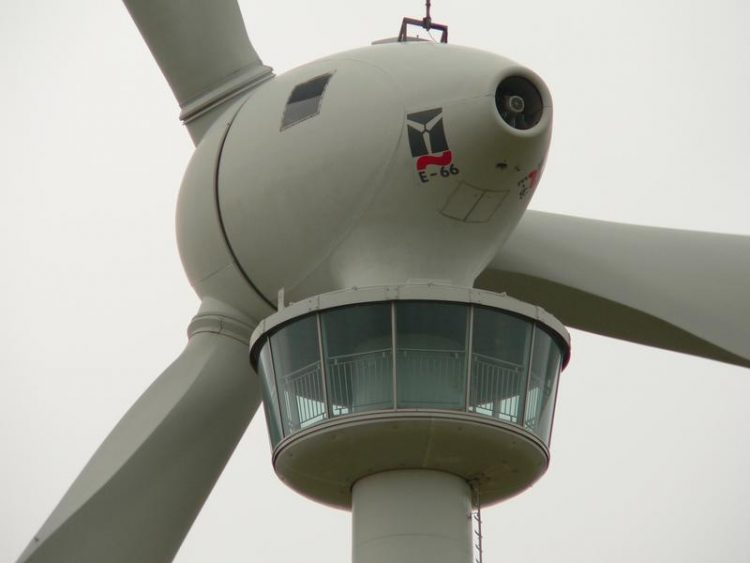unverDROSSen – efficient, conservation-friendly production of large casting components

“Turret of the Südkronsberg wind power turbine from below“ ©: Axel Hindemith / Wikimedia Commons
Manufacturers of cast components (wind power turbines and ship engines for instance) are all too aware of the problem with dross, an issue that has not been resolved to date.
A research project involving renowned industry partners has finally opened up the possibility of examining large casting components with dross defects in a targeted fashion and developing ways to turn dross into usable parts, keep the re-work to a minimum and in particular avoid the scrapping of defective components, something which is a major benefit to manufacturers and users.
For more than 40 years, researchers at the Fraunhofer Institute for Nondestructive Testing IZFP have been involved in the development and enhancement of innovative nondestructive testing (NDT) methods for every conceivable industry.
Whether it`s cracks, delamination, material damage or material changes, these defects may frequently be invisible to the human eye, but not to the nondestructive testing experts at Fraunhofer IZFP. To date, the research industry has had little involvement in the problem of dross since these components are either re-worked or declared as rejects.
“Research has shown that several nondestructive testing processes possess excellent potential in more accurately identifying and characterizing these impurities. Our part in the unverDROSSen research project involves further developing existing NDT processes and where applicable to transfer newly developed processes into practical application,“ explains Dr. Jochen Kurz head of the Materials Characterization department at Fraunhofer IZFP. Working closely together with Fraunhofer IZFP is the Fraunhofer Institute for Structural Durability and System Reliability LBF, which is examining the issue of structural durability.
The unverDROSSen** project is being sponsored by the German Federal Ministry of Education and Research through its Jülich project management organization. Under the project leadership of Fraunhofer LBF and with the participation of renowned industry and association partners, the primary aim is to transfer the results of the research into practical applications for industry. The project is slated for completion by the end of 2017.
* Dross describes impurities caused by oxidation that form on the surface of molten metals. Components that exhibit these types of structural defects are frequently rejected during the construction of wind power Systems
** (a German word that means thorough, with painstaking care)
Media Contact
All latest news from the category: Machine Engineering
Machine engineering is one of Germany’s key industries. The importance of this segment has led to the creation of new university degree programs in fields such as production and logistics, process engineering, vehicle/automotive engineering, production engineering and aerospace engineering among others.
innovations-report offers informative reports and articles covering technologies such as automation, motion, power train, energy, conveyor, plastics, lightweight construction, logistics/warehousing, measurement systems, machine tools and control engineering.
Newest articles

You are What You Eat—Stanford Study Links Fiber to Anti-Cancer Gene Modulation
The Fiber Gap: A Growing Concern in American Diets Fiber is well known to be an important part of a healthy diet, yet less than 10% of Americans eat the minimum recommended…

Trust Your Gut—RNA-Protein Discovery for Better Immunity
HIRI researchers uncover control mechanisms of polysaccharide utilization in Bacteroides thetaiotaomicron. Researchers at the Helmholtz Institute for RNA-based Infection Research (HIRI) and the Julius-Maximilians-Universität (JMU) in Würzburg have identified a…

ASXL1 Mutation: The Hidden Trigger Behind Blood Cancers and Inflammation
Scientists show how a mutated gene harms red and white blood cells. LA JOLLA, CA—Scientists at La Jolla Institute for Immunology (LJI) have discovered how a mutated gene kicks off…



